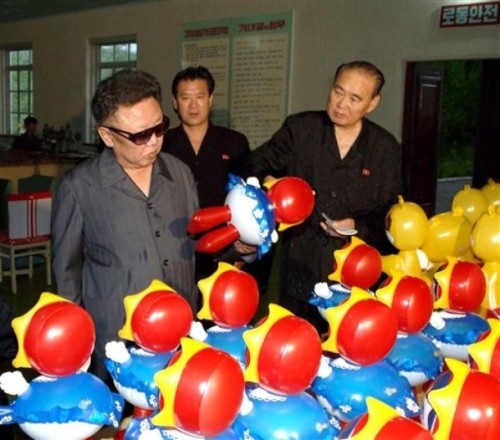Wednesday, January 5, 2011
The best case for freedom is written on North Korean faces
Without speaking for others, I'll admit I'm worried. Maybe the Dear Leader is onto something about human nature.
The interesting thing is not what Kim Jong-Il is saying with his face, but what the people in the background are making of it.
What do the faces in the backgrounds of all these pictures say to you? To me, they show emotions ranging from worry to pleasure to glee that the Dear Leader is Looking at Their Things.
The Dear Leader never shows in these pictures anything but Curiosity or Pleasure at the Things at which he Looks. The people who are Looking at him Looking At Things clearly care what impression their Things make on Him, but feel more or less uncertain about it.
I think this is what fear does to people. I've seen that same look among students who have certain church-political commitments they think their lives depend upon. They come in my office and want to close the door and talk about what they really believe, in contrast to what their Dear Leaders insist they pretend to believe.
Being a Dear Leader is bad leadership. Effective, obviously, but no less bad for that.
If there were nothing else speaking for it, the looks on those faces in the background are a definitive case for freedom.
How could we have helped this departing professor?
(I do know I'm a pollyanna, by the way.)
Tuesday, January 4, 2011
No Limits
"The underlying thing for me is relationships—hardly anything important happens that doesn't have to do with relationships," he says quietly one afternoon in his office. He is not talking just about cozying up to a wealthy donor or board chairman. He is talking about building connections to needy students, the lowliest employees, the local community. "It's getting to know people, being interested in them. … Life is built on genuine relationships, where trust and integrity are without question. When that is there, there are no limits."
Tuesday, December 21, 2010
Reading People with Bad Reputations
It occurred to me afterward that it's interesting that he's the only person I know who has expressed a deep interest in a figure even more problematic than my friend Talleyrand.
Michael has built much of his academic career on an effort to rehabilitate Machiavelli as a guide to contemporary leadership.
I've got to be in favor of that, right?
Wisdom about the Presidency
The first goal I set after becoming president of Louisville Seminary was to visit with every current board member and every faculty member, all of our staff, and as many current students as are available, as well as many past members of the board, alums, pastors, other church leaders, and friends of our school, within the first year of my presidency. I am eight weeks into the project, and we are well on our way.He is finding that the stereotypes some might have brought to the job do not apply. His experience reinforces the insight that it's crucial for the president to question his or her own assumptions. It's hard enough for a president to find out the truth without compounding the problem by failing to ask enough questions.
Wednesday, June 23, 2010
Synchronicity
This wonderful gift notwithstanding, he is being petty, in my opinion, about this.
Wednesday, May 12, 2010
The donor database is the key to a good night's sleep
The reason, of course, is that too often people try to use money to manipulate mission. "If you don't ________, I'm going to withhold my giving." When someone says that, you have to know exactly what it means.
It happens in higher ed as well, unfortunately. But there's a difference. In higher education, there's no piety to overcome. Everyone knows or should know that there's a database at hand that stores the giving record of the one who is making the threat.
Dave Dunlop says somewhere that one of the first requirements of a good fund raiser is "a kind and forgiving nature." That's partly because people disappoint you all the time with their motives for giving and not giving. I've been told some doozies. And that's fine. The person who looked me in the eye last summer and told me he gives every year six times what I knew he really gave is still being generous in light of his resources. So a big thanks to him.
Recently I've been informed that two gifts, one of six figures and the other seven, have been "revoked" because of this and that. Thanks to this wonderful software product, I know that it takes me less than three days to earn in salary the combined total lifetime giving of these two friends of the institution. That doesn't mean we're not forgoing $1.7-million between them, but given what I know for sure, I can live with that uncertainty.
So I forgive them and I'll be kind to them. And I'll keep in touch with them, just in case. But tonight I'm going to get some sleep.



